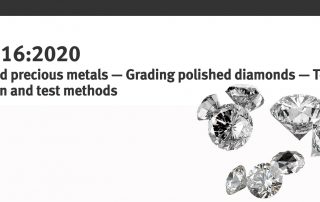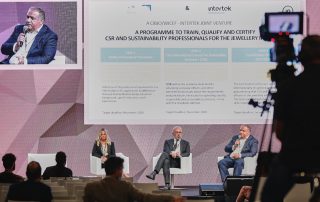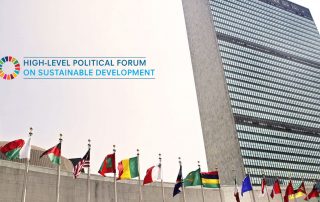About Steven Benson
This author has not yet filled in any details.So far Steven Benson has created 302 blog entries.
CIBJO describes as ground-breaking the publication of ISO 24016, first internationally recognised diamond-grading standard
SEPTEMBER 23, 2020
CIBJO, the World Jewellery Confederation, has described as ground-breaking the publication by the International Standards Organisation of ISO 24016, the first-ever standard approved by the body that specifies the terminology, classification and the methods to be used for the grading and description of single unmounted polished diamonds.
“This is a historic moment for our industry,” said CIBJO President Gaetano Cavalieri, “for it is the first time than a strictly defined diamond grading system has been ratified by the world’s leading standards body, formally recognizing principles and terminology that to date have not been approved by any impartial and international authority. ISO 24016 essentially parallels the CIBJO Diamond Blue Book, meaning that our widely-accepted standard is now effectively validated by ISO.”
“The aim of a standard for grading unmounted polished diamonds is to set rules for determining with maximum precision and accuracy the mass, colour, clarity and cut of individual polished diamonds,” ISO 24016 notes in its introduction. “On one hand, based on these four criteria – also known as ‘the 4Cs’ – the diamond trade evaluates the value of diamonds. On the other hand, some diamond grading reports may be issued based on different standards by different laboratories, potentially leading to different results for the same individual diamond. This situation damages the reputation of the whole diamond trade. Hence, the need for a unique ISO standard for grading polished diamonds.”
ISO 24016 applies to natural, unmounted, polished diamonds of more than 0.25 carats. It is a comprehensive technical document, 55 pages in length, providing detailed information with tables and figures. It expressly does not apply to fancy coloured diamonds, synthetic (laboratory-grown) diamonds, diamonds treated by methods other than laser drilling, nor to assembled stones.
It is the second standard issued by the International Standards Organisation dealing specifically with diamonds. ISO 18323, which was released in 2015, defined specific nomenclature for natural diamonds, synthetic diamonds and diamond simulants. It was reconfirmed last week after a five-year systematic review process.
Headquartered in Geneva, ISO is an independent, non-governmental international organisation, to which are are affiliated 165 national standards bodies. It operates 333 Technical Committees covering 253 sectors, among them food and agriculture, energy, health, mechanical engineering, communications, and more, bringing together experts that share knowledge and develop voluntary, consensus-based, market-relevant international standards that support innovation and provide solutions to global challenges. To date, more than 23,000 ISO standards have been issued. Issues in ISO related to jewellery and precious metals are handled by Technical Committee 174, chaired by Dr. Jonathan Jodry, which has participants and observers from 40 countries and is responsible for more than 25 international standards.
The process of developing a new standard for diamond grading began two years ago at the request of Schweizerische Normen-Vereinigung (SNV), the Swiss Association for Standardisation. The initial stage of preparing a draft document was accelerated in 2018, when CIBJO granted ISO permission to use its own Publicly Available Specification PAS 1048, based on the CIBJO Diamond Blue Book, as a basis for drafting the new ISO standard. Jean-Pierre Chalain, Vice President of CIBJO’s Diamond Commission, was designated as the convenor of TC174 Working Group 2, to oversee the project.
The process of deliberation and review took about two years to complete, and was managed thanks to the dedication of a team of internationally renowned diamond experts from 10 different countries. After consensus among the technical specialists was reached, the draft was shared with all ISO National Members from the Technical Committee for further comments, and then a final draft was sent to all ISO TC members for ratification.
“This a massive achievement for the diamond industry, and it was achieved through hundreds of hours of hard work, and a painstaking international vetting process,” said Udi Sheintal, President of CIBJO’s Diamond Commission. “Now, for the first time, we can say without equivocation that a entire gemstone category, namely diamonds, has been fully addressed by the International Standards Organisation, which through ISO 24016 and ISO 18323 comprehensively provides an accurate definition of diamonds, and the ways in which they are described and graded. Furthermore, with both standards being so closely associated with the CIBJO Diamond Blue Book, we can take great pride in our processes and professionalism.”
“There is no doubt in my mind that these two international ISO standards, together with the CIBJO Diamond Blue Book, will help boost consumer confidence,” Mr. Sheintal said. “The timing is particularly relevant, especially now when clear distinctions must be made between laboratory-grown diamonds and natural diamonds.
Mr. Chalain stressed that major asset of the standard ISO 24016 is that will be regularly subject to a systematic review process, to ensure that it remains relevant to the needs of the diamond trade. He thanked all the various participants in two-year process, and in particular CIBJO President Gaetano Cavalieri, CIBJO Diamond Commission President Udi Sheintal, Rudi Biehler, ISO TC 174 Chair Jonathan Jodry, ISO TC 174 Secretary Petra Bischoff, and Patrick Lötscher, Secretary of ISO TC 174 Working Group 2.
The new ISO 24016 standard can be purchased and downloaded from the ISO website at: https://www.iso.org/standard/79795.html.
CIBJO and Intertek announce first-ever programme to educate and certify CSR, sustainability and SDG officers for the jewellery industry
ABOVE: Alessandro Ferracino (right), Regional Director of Italy & France Intertek, describing the CIBJO/WJCEF and Intertek to train and certify CSR, sustainability and SDG professionals for the jewellery and gemstone industry, during the VOICE VicenzaOro trade event in Vicenza, Italy, on September 12, 2020. He joined on the podium by Maria Francesca Bergamaschi (left), Intertek Italy’s South Europe Sustainability Manager and Global Manager for the company’s programme with the Responsible Jewellery Council; and Raul Sapora, Intertek Italy’s gemmologist.
SEPTEMBER 17, 2020
CIBJO, the World Jewellery Confederation, and Intertek Italia SpA, the Italian subsidiary of the Intertek Group, a multinational assurance, inspection, product-testing and certification company that assists companies ensure that their operating procedures and products meet quality, health, environmental, safety, and social accountability standards, have announced a joint initiative to educate, train and certify CSR, sustainability and Sustainable Development Goals (SDG) compliance officers, specifically for the gemstone and jewellery industries. It will be the first dedicated programme of its sort worldwide.
The announcement was made on September 12, 2020, during the opening day of the VOICE VicenzaOro trade event in Vicenza, Italy, by CIBJO President Gaetano Cavalieri, who was joined on the main stage by Alessandro Ferracino, Regional Director of Italy & France Intertek; Maria Francesca Bergamaschi, Intertek Italy’s South Europe Sustainability Manager and Global Manager for the company’s programme with the Responsible Jewellery Council; and Raul Sapora, Intertek Italy’s gemmologist.
Speaking to the gathering, which was simultaneously streamed worldwide, Mr. Ferracino explained that a three-track programme is being planned, beginning with the defining of professional qualification standards for several levels of jewellery industry CSR/sustainability/SDG compliance officers, specifying what each requires in terms of educational background, standards proficiency and work experience. The different officers would include Sustainability Managers, CSR Managers, Sustainability & CSR Auditors, SDG Action Managers and SDGs Users. The positions and their respective qualifications would first be approved by UNI, Italy’s national standardization authority, and that would lead to internationally recognized accreditation.
The second step will involve the creation by CIBJO’s educational arm, the World Jewellery Confederation Education Foundation (WJCEF), of the International Council for Sustainable Business (ICSB), which will be an academy providing educational programmes that provide prospective compliance officers with the knowledge and skills necessary. Potential candidates for the courses provided through ICSB would be employees of companies operating in the jewellery and gemstone industries, or individuals seeking employment as compliance officers in the sector.
The third step, which will be carried out by Intertek, will be the certification of persons for the various levels of compliance officers, according to an internationally recognized accreditation process. Certification will ascertain that the CSR, sustainability and SDG compliance officers have achieved the necessary competences, knowledge and skills required for their assigned tasks.


CIBJO President Gaetano Cavalieri speaking during the session in Vicenza on September 12, 2020, at which the CIBJO/WJCEF agreement with Intertek was announced.
There are already a range of a CSR, sustainability and SDG standards being applied in our industry, and not only is the number likely to increase, but so are the demands that companies must comply with them in order to gain access to both suppliers and customers,” said Dr. Cavalieri. “But the process can be confusing, and as a result there is a growing need for professional compliance officers, who also are familiar with the specific requirements of our industry, such as the Kimberley Process Certification Scheme, the World Diamond Council System of Warranties, the Responsible Jewellery Council Code of Practice, the Dodd-Frank Act, the European Conflict Minerals legislation and the OECD conflict minerals guidance, not to mention compliance systems required by private companies.”
“The goal of this programme is to create a class of internationally recognized jewellery industry CSR, sustainability and SDG professionals, who will help companies become compliant,” Dr. Cavalieri continued. “There clearly is a gap in the industry’s skill set, and together with Intertek, CIBJO and WJCEF seek to fill it.”
United Nations publishes CIBJO statement to ECOSOC High-Level Political Forum on Sustainable Development
JULY 8, 2020
The Office of the United Nations Secretary General has announced the publication of statements delivered by NGOs affiliated to the UN Economic and Social Council (ECOSOC), for the High-Level Political Forum on Sustainable Development that is currently taking place. Only 179 statements from the more than 5,400 NGOs affiliated to ECOSOC were published, and among them was the declaration delivered by CIBJO, the World Jewellery Confederation.
Representing the international jewellery sector in the key UN agency, which is responsible for promoting the body’s Sustainable Development Goals, CIBJO became the first and only jewellery industry organisation in ECOSOC when it received special consultative status in 2006.
“CIBJO, the World Jewellery Confederation, remains committed to the implementation of the Sustainable Development Goals (SDGs), and to furthering this objective through the leadership, educational activities and other services that it provides globally within the greater jewellery industry, along its full value chain, from the mining regions through to the retail markets. More specifically, it supports the theme of the 2020 ECOSOC High-Level segment ‘Accelerated action and transformative pathways: realizing the decade of action and delivery for sustainable development,’ obligating itself to sustained action within its sector and among its stakeholders during the final ten years of the 2030 Agenda for Sustainable Development,” CIBJO declared at the opening of its statement.
The CIBJO statement referred specifically to the current coronavirus pandemic and its impact on communities dependent upon revenues generated by jewellery, precious metals and gemstones. “The current COVID-19 pandemic, which poses massive health and economic challenges to the world community in general, represents a particular risk to the sector that CIBJO serves, and more particularly to those individuals and communities in developing countries, who rely on the support and economic leverage provided by the jewellery, precious metals and gemstone sectors, which currently are under threat. At the same time, new technologies and processes that are being applied to cope with the pandemic and its various impacts provide the promise of improving CIBJO’s ability to better serve its stakeholders beyond the crisis. Most importantly, COVID-19, which does not discriminate between people, nations and regions, underscores the degree to which all of humanity is interdependent,” it noted.
To download a full copy of the CIBJO statement to the ECOSOC High-Level Political Forum on Sustainable Development, PLEASE CLICK HERE.




